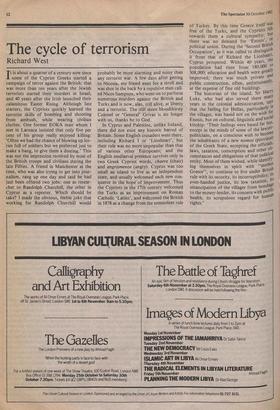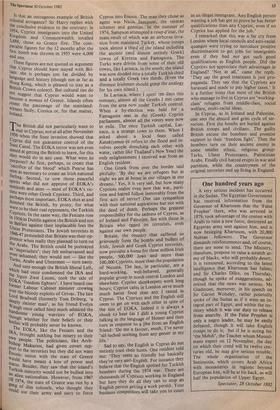The cycle of terrorism
Richard West
It is about a quarter of a century now since some of the Cypriot Greeks started a campaign of terror against the British: that was more than ten years after the Jewish terrorists started their murders in Israel, and 40 years after the Irish launched their calamitous Easter Rising. Although late starters, the Cypriots quickly learned the terrorist skills of bombing and shooting from ambush, while wearing civilian clothes. One former EOKA man whom I met in Larnaca insisted that only five per cent of his group really enjoyed killing: 'Often we had the chance of blowing up lor- ries full of soldiers but we preferred just to make a bang, to give them a dusting.' This was not the impression received by most of the British troops and civilians during the late Fifties. A friend in Manchester at the time, who was also trying to get into jour- nalism, rang up one day and said he had just been offered two jobs: one as resear- cher to Randolph Churchill, the other in Cyprus as a reporter. Which should he take? I made the obvious, feeble joke that working for Randolph Churchill would
probably be more alarming and noisy than any terrorist war. A few days after getting to Nicosia, my friend went for a stroll and was shot in the back by a repulsive man call- ed Nicos Sampson, who went on to perform numerous murders against the British and Turks and is now, alas, still alive, at liberty and a terrorist. The still more bloodthirsty Colonel or 'General' Grivas is no longer with us, thanks be to God.
In Cyprus and Palestine, unlike Ireland, there did not exist any historic hatred of Britain. Some English crusaders went there, including Richard I or Tionheare, but their rule was no more unpopular than that of various other Europeans; and the English mediaeval presence survives only in two Greek Cypriot words, chaera (chair) and angrismenos (angry). Cyprus was too small an island to live as an independent state, and usually welcomed each new con- queror in the hope of improvement. Thus the Cypriots in the 17th century welcomed the Turks as an improvement on Roman Catholic 'Latins', and welcomed the British in 1878 as a change from the somnolent rule
of Turkey. By this time Greece itself was free of the Turks, and the Cypriots felt towards them a cultural sympathy; but there was no demand for 'Enosis', .0r political union. During the 'Second British Occupation', as it was called to distinguish it from that of Richard the Lionheart, Cyprus prospered. Within 40 years, the population had risen from 180,000 to 308,000; education and health were greatlY improved; there was much private and public construction, often, unfortunately' at the expense of fine old buildings.
The historian of the island, Sir Harry
Luke, who had also served there Mall years in the colonial administration, saY5 that the feeling for Hellas, particularlY 111 the villages, was based not on the wish f,°r, Enosis, but on cultural, linguistic and social kinship: 'Their feelings were based far less, except in the minds of some of the lawyer- politicians, on a conscious wish to become the inhabitants of a new nomos (province) of the Greek State, accepting the officials, laws, taxation, conscription and other cir- cumstances and obligations of that political entity. Most of them wished, while identify' mg themselves in spirit with "mother Greece", to continue to live under British rule with its security, its incorruptibility, its even-handed justice, its low taxation, Its emancipation of the villager from bondage to the money-lender, its concern with public health, its scrupulous regard for human rights.'
is that an outrageous example of British colonial arrogance? Sir Harry replies with the conclusive evidence to the contrary: in 1954, Cypriot immigrants into the United Kingdom and Commonwealth totalled 3,688, those to Greece five. The com- parable figures for the 12 months after the first bomb was thrown in 1955 were 4,000 and one.
These figures are not quoted as argument that Cyprus should have stayed with Bri- tain: she is perhaps too far divided by language and history (though not as far as Hong Kong, which is pleased to stay as a British Crown colony). But cultural ties do not suggest that Cyprus would want to become a nomos of Greece. Islands often resent the patronage of the mainland: witness Sicily, Corsica or, for that matter, Ireland.
he British did not particularly want to The in Cyprus; not at all after November 1956 when the Suez invasion showed that Cyprus did not guarantee control of the Suez Canal. The EOKA terror was not even aimed at getting the British to leave, for this they would do in any case. What were its Purposes? At first, perhaps, to create that sacrifice of the blood' which Pearse has seen as necessary to create an Irish national feeling. Second, to cow those peaceful spirits who did not approve of EOKA's methods and aims — most of EOKA's vic- tims were other Greek Cypriots. Third, and Perhaps most important, EOKA shot at and bombed the British, by proxy, for what were to be their real opponents, the Turkish Cypriots. In the same way, the Fenians rose 10 1916 in Dublin against the British and not in Belfast against their implacable foes the Ulster Protestants. The Jewish terrorists in 1946_47 pretended that Britain was their op- Pressor when really they planned to turn on the Arabs. The British could be portrayed as 'imperialists'; they felt embarrassed and even ashamed; they would not — like the %irks, Arabs and Ulstermen — turn nasty. And sure enough the British liberal Left, Which had once condemned the IRA and the Irgun Zwei Leumi, took the side of EOKA 'freedom fighters'. I have heard one former Labour Cabinet minister crowing over the bloody exploits of Grivas. The late Lord Bradwell (formerly Tom Driberg, 'a cieePly sinister man', as his friend Evelyn laugh once called him) much admired the handsome young warriors of EOKA, though whether for their beliefs or their bodies will probably never be known. The EOKA, like the Fenians and the IttA, brought nothing but misery to their 1°).w,l1 People. The politicians, like Arch- is11010 Makarios, had given covert sup- Port to the terrorists but they did not want trios's: union with the state of Greece would have meant a loss of power and status. Besides, they saw that the island's Turkish minority would not be bullied into ,t1, alien nationalism. However, from 1967 r,`111 1974, the state of Greece was run by a gang of dim colonels, who thought they could use their army and navy to force Cyprus into Enosis. The man they chose as agent was Nicos Sampson, the veteran schemer and gunman. In the summer of 1974, Sampson attempted a coup d'etat, the main result of which was an airborne inva- sion from mainland Turkey, whose troops took almost a third of the island including the ancient (and almost entirely Greek) towns of Kyrenia and Famagusta. The Turks were driven from some of their old towns, like Larnaca, in the south; the island was now divided into a totally Turkish third and a totally Greek two thirds. (Even the dimmest Irishman should grasp the analogy for his own island.) In Larnaca, where I spent ten days this summer, almost all the Greeks 1 met came from the area now under Turkish control. When a by-election was held for a Famagusta seat in the (Greek) Cypriot parliament, almost all the voters were now in exile. The once Turkish capital, Lar- naca, is a strange town to them. When I asked about a local feast called Kataklysmos (it refers to the flood and in- volves people drenching each other with water, rather like Thailand's New Year) the only enlightenment I received was from an English resident.
One Greek from over the border said pitifully: 'By day we are refugees but at night we are at home in our villages in our dreams.' Yes, it is very sad, but how many Cypriots realise even now that war, parti- tion and hatred follow inexorably from the first acts of terror? One can sympathise with their national aspirations but not with the deed of death. Perhaps the greatest responsibility for the sadness of Cyprus, as of Ireland and Palestine, lies with those in Britain who egged on terrorists, even against our own people. Britain, the country that suffered so grievously from the bombs and bullets of Irish, Jewish and Greek Cypriot terrorists, now provides a home for three million Irish people, 500,000 Jews and more than 100,000 Cypriots, more than the population of Nicosia. The last, in particular, are a hard-working, well-behaved, generally popular group in north central London and elsewhere. Cypriot shopkeepers work long hours; Cypriot cafes in London serve much much better food than any I tasted in Cyprus. The Cypriots and the English still seem to get on with each other in spite of the sins of EOKA. Indeed it is always a shock to hear (as I did) a young Cypriot talking in the language of Homer and then turn in response to a jibe from an English friend: 'Do me a favour, mush, I've never 'alf-inched nothing from any geezer in my life.' Sad to say, the English in Cyprus do not entirely trust their hosts. One resident told me: 'They seem so friendly but basically they're very anti-English, For instance they believe that the English spotted for Turkish bombers during the 1974 war. There are thousands of Cypriots working in England but here they do all they can to stop an English person getting a work permit. Your business competitors will take you to court
as an illegal immigrant. Any English person wanting a job has got to prove he has better qualifications than any Cypriot, even if no Cypriot has applied for the job.'
I remarked that this was a far cry from London where local councils and anti-racial quangos were trying to introduce positive discrimination to get jobs for immigrants even if they had not got such good qualifications as English people. Did the Cypriots not appreciate their advantages in England? 'Not at all,' came the reply. 'They say the good treatment is just pro- paganda. They say that the Cypriots are harassed and made to pay higher taxes.' It is a further irony that most of the British who manage to live in Cyprus are 'working- class' refugees from middle-class, social welfare, multi-racial ideas.
In Cyprus, as in Ireland and Palestine, one sees the absurd and grim cycle of ter- rorism. First the bombs are hurled against British troops and civilians. The guilty British excuse the bombers and promise support to their 'freedom fight'. Then the bombers turn on their ancient enemy in some smaller ethnic, religious group: Turks, Ulster Protestants, Palestinian Arabs. Finally civil hatred erupts in war and partition, while the countrymen of the original terrorists end up living in England.











































 Previous page
Previous page